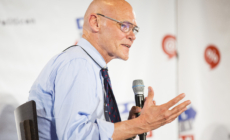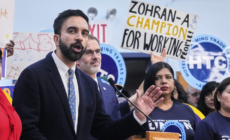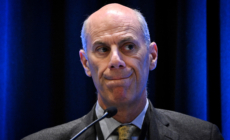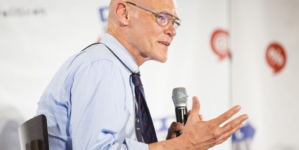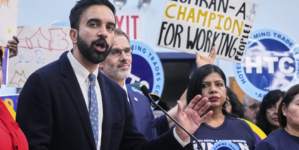-
Blue Jays Must Address This ‘Urgent’ Flaw At Trade Deadline, Says Top MLB Analyst - 19 mins ago
-
What We Know About the Shooting in Midtown Manhattan - 37 mins ago
-
Trump’s ‘Big, Beautiful Bill’ A ‘Gift’ for Democrats, James Carville Says - 54 mins ago
-
Park Avenue Gunman Drove Cross Country Before Committing the Attack, Police Said - about 1 hour ago
-
Zohran Mamdani Reacts to NYC Shooting: ‘Heartbroken’ - about 1 hour ago
-
Saquon Barkley’s Reaction to Cooper DeJean’s Shocking Nod - 2 hours ago
-
Finland’s Short, Precious Summers Are Plagued by Goose Poop - 2 hours ago
-
Dallas Wings Take Shot at Liberty Online After Shocking Upset - 3 hours ago
-
Site of Midtown Shooting Is Owned by Rudin Management and Houses NFL and Blackstone - 3 hours ago
-
Pam Bondi Files Complaint Against Judge Over Making ‘Improper’ Comments About Trump - 3 hours ago
Kushner Deal in Serbia Follows Earlier Interest by Trump
The plan by Jared Kushner and his business partners to redevelop a prized location in Serbia’s capital, Belgrade, echoes interest from Donald J. Trump a decade ago in pursuing a deal for the site and a similar proposal pushed during his White House term by a top aide now working with Mr. Kushner, a review of the project shows.
The tentative agreement between the Kushner team and the Serbian government would grant Mr. Kushner’s investment firm a 99-year lease, at no charge, and the right to build a luxury hotel and apartment complex and a museum on the site of the former headquarters of the Yugoslav Ministry of Defense in Belgrade, which was bombed by NATO in 1999. A draft outline of the agreement was provided to The New York Times by a Serbian official.
In 2013, two years before he began running for president, Mr. Trump — Mr. Kushner’s father-in-law — told a top Serbian government official that he wanted to build a luxury hotel on the site. Associates of the Trump Organization traveled to Belgrade to inspect the location. The project did not come together before Mr. Trump’s election in 2016, and after being sworn in he vowed to not do any new foreign deals.
But developing the site would again draw interest from Mr. Trump’s circle.
Richard Grenell, whom Mr. Trump had appointed as a special envoy in the Balkans, pushed a related plan during the Trump administration that Serbia and the United States jointly work to rebuild the Defense Ministry site. He argued in favor of using American investments to transform the Belgrade site while he was still serving in his official capacity as an American diplomat in 2020, according to transcripts and a recording of remarks made during several government news conferences.
Mr. Kushner said in an interview on Sunday that he had never discussed the Belgrade project with Mr. Trump and was not aware of his father-in-law’s prior interest in redeveloping the site.
“I had no idea my father-in-law had been interested in that region, and I doubt he has any awareness of this deal we are working on,” Mr. Kushner said.
Representatives of Mr. Trump did not respond to multiple requests for comment about either Mr. Kushner’s current effort or Mr. Trump’s prior interest in the Belgrade development.
Mr. Grenell said he, too, had no knowledge of Mr. Trump’s interest in the site before his presidency. But he is now working with Mr. Kushner on the new development deal and, according to Mr. Kushner, was the main force in driving him to consider the Belgrade investment.
In his role as special envoy during the last two years of the Trump administration, Mr. Grenell helped foster economic reconciliation talks between Serbia and Kosovo, two neighboring nations that have had tense relations since the end of the Bosnian war in 1995.
The link between Mr. Grenell’s role in pushing for redevelopment of the Belgrade site while both in and out of government and Mr. Kushner’s tentative agreement now to carry out the proposal for personal profit raises fresh questions about conflicts of interest between their public roles and private wealth as Mr. Trump again seeks the presidency, with foreign governments watching closely.
Mr. Kushner confirmed on Friday that his investment firm was pursuing the deal in Serbia, as well as luxury real estate projects in Albania, and that he expected to finalize agreements soon.
The overlap between the official actions that Mr. Kushner and Mr. Grenell took while serving in government and the business deals they are pursuing in regions where they served carries echoes of deals struck by former Treasury Secretary Steven Mnuchin and Mr. Kushner in the Middle East after leaving office.
Mr. Mnuchin and Mr. Kushner, who both were active in Middle East diplomacy, each set up investment firms after leaving the Trump administration that then secured billions of dollars from the Saudi government and hundreds of millions of dollars from other Middle Eastern nations.
Kathleen Clark, a law professor at Washington University in St. Louis who specializes in government ethics, said the Kushner project in Serbia would create a conflict of interest if Mr. Trump was re-elected, even if it was not some long-running effort by the family to get access to the site.
“The concern is the Serbia government may attempt to influence a future President Trump by enriching the president’s family,” she said. “Foreign policy toward Serbia should be influenced by what is in the United States’ interests, not any financial favors coming from the Serbian government.”
The 2020 pitch by Mr. Grenell to reconsider rebuilding at the site of the bombed-out former military headquarters came, according to Serbia government officials, right after Mr. Trump had hosted Aleksandar Vucic, the president of Serbia, at the White House. During that visit, Mr. Vucic praised the progress Mr. Grenell had made in normalizing economic relations between Serbia and Kosovo.
Mr. Trump also praised Mr. Grenell at the ceremony, where Mr. Grenell described the progress between the two sides as a clear result of the Trump presidency and one that could lead to a political breakthrough. Mr. Kushner was serving as a senior White House adviser to Mr. Trump at the time.
“From the very beginning, what President Trump said is: Let’s give them a little taste of the Trump economy,” Mr. Grenell said, according to a transcript of the event. “Let’s show them how to develop economics, how to take industries and grow them.”
In 2018 and 2019, while serving as ambassador to Germany in the Trump administration, Mr. Grenell, who has told confidants that he aspires to be secretary of state in a second Trump term, sought to expand his portfolio and deliver high-profile wins for his boss. He had alienated top officials in the German government through his caustic style of diplomacy but had begun to cultivate other relationships across Europe, including with Mr. Vucic.
While still ambassador to Germany, Mr. Grenell pitched Mr. Trump on the idea of appointing him to mediate the longstanding conflict between Serbia and Kosovo, two former Trump administration officials said.
Twenty-five years ago, the U.S.-led NATO forces intervened militarily to protect Muslims in Kosovo from ethnic cleansing by the Serbian government. The former Yugoslav army headquarters in the center of Belgrade, while largely unused at the time, were one target. The site has stood in its damaged state since then and is seen by Serbs as a symbol of their suffering during the NATO attacks.
In 2008, Kosovo unilaterally declared its independence from Serbia, which does not officially recognize Kosovo as a sovereign country.
In October 2019, Mr. Trump appointed Mr. Grenell as his “special presidential envoy for Serbia and Kosovo peace negotiations.”
The State Department already had a team working on these issues, and Mr. Grenell had relatively little experience in the Balkans.
Mr. Grenell was widely seen among European diplomats as favoring the Serbian side in the negotiations, and he was warmly received in Belgrade. He applied immense pressure on Prime Minister Albin Kurti of Kosovo to drop tariffs on Serbian products, and prominent Trump allies began publicly calling for the withdrawal of U.S. peacekeepers from Kosovo. Mr. Grenell did have one important ally in Kosovo: the president at the time, Hashim Thaci, who was later charged with war crimes.
Mr. Grenell rejected any suggestion that he played favorites. He said he was ultimately honored by leaders from both nations — Mr. Vucic in Serbia and Mr. Thaci in Kosovo — for his role in helping broker an economic normalization agreement.
But he acknowledged that he had in particular made progress under Mr. Trump in tightening economic ties between the United States and Serbia.
“I had built up a lot of love for bringing the Serbian-American relations forward,” Mr. Grenell said in an interview with The Times on Sunday.
During his time as envoy in the Balkans, Mr. Grenell developed friendships with top Serbian officials, including Mr. Vucic and Sinisa Mali, the Serbian finance minister, who officials in Belgrade said played a role in tentatively approving the Kushner hotel deal. Mr. Mali did not respond to requests for comment.
Mr. Grenell posted on his Instagram page a video of him and Mr. Mali singing in 2021 inside a packed Belgrade club surrounded by others dancing to pulsating music, while waving Serbian flags and holding up sparklers and torches.
Mr. Grenell returned to Serbia and neighboring Albania shortly after Mr. Trump left the White House to begin pushing development projects that have since been adopted by Mr. Kushner’s company, including the Belgrade deal.
The draft outline of the agreement provided to The Times by a Serbian government official also specifies the option of formally transferring ownership of the property to Mr. Kushner’s partnership free of charge, after the hotel complex and luxury residential units are built.
Mr. Kushner, in an interview, did not dispute the veracity of the document obtained by The Times. He said the parties had tentatively agreed to give the Serbian government 22 percent of the profits generated by the approximately $500 million project.
Mr. Kushner’s company, Affinity Partners, said in a statement that the Belgrade site would be “transformed into a world-class luxury hotel” but that it would also include a museum and memorial designed by Serbian architects, to pay tribute to the location’s importance in recent Serbian history.
Mr. Kushner said Mr. Grenell had encouraged him to pursue the project.
“Ric is a big advocate for investing in the Balkans and has been trying to get me to invest in this project since I launched my fund,” Mr. Kushner said, noting that an American company would be rebuilding a site that NATO had bombed.
Representatives of the Serbian government did not immediately respond to questions and multiple requests for comment.
Danijela Nestorovic, an opposition party member of Serbia’s Parliament, and other members of her party condemned the proposed Kushner deal in a statement to The Times, noting that several people were killed and 40 wounded during the period of the NATO attack when the building was struck.
“The General Staff HQ building is a memorial for us,” she said in the statement, referring to the bombed-out military headquarters. “It initiates deep, hidden emotions to the victims of the NATO bombing. To build a hotel there — it would be a mockery to the citizens of Serbia.”
Mr. Grenell, in an interview, said that the Kushner deal represented an opportunity to “turn a symbol of previous conflict into a bridge of friendship and renewal,” and that it “symbolizes the tremendous progress that has been made to heal the wounds from the past.”
In 2020, when Mr. Grenell had pushed Serbian officials to consider working with American investors to redevelop the Belgrade site, Ivica Dacic, who by then was serving as foreign minister in the Serbian government, recalled a visit he had made to Trump Tower in New York in 2013. It was then that Mr. Trump had first discussed the hotel project at the former defense headquarters site.
“I don’t think he has forgotten that desire,” Mr. Dacic said at a news conference in 2020, referring to Mr. Trump.
The proposed project in Serbia is only one of three deals that Mr. Kushner and Mr. Grenell are trying to develop in the Balkans.
Mr. Kushner said on Friday that final contracts had not been signed, but that negotiations were far along and that he was hopeful they would be finalized. He disputed any suggestion that his company was getting special treatment.
He also said that he knew how high-profile his position is — he is married to Mr. Trump’s elder daughter, Ivanka, and played a prominent role in the Trump White House — so he had no choice but to be careful to act within legal and ethical boundaries.
“Everything has to be completely aboveboard,” he said.
Ben Protess contributed reporting.




